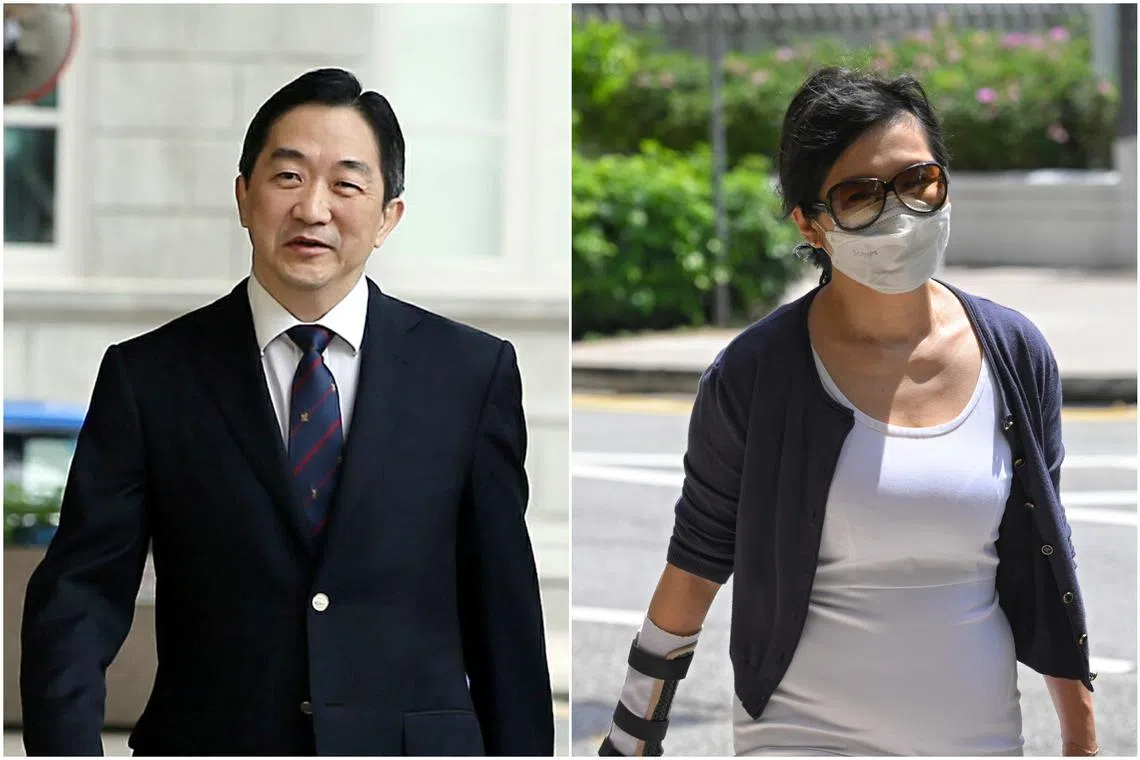Prosecutors seek 40-year jail sentence for penny stock crash mastermind, 19½ years for ex-girlfriend
Sign up now: Get ST's newsletters delivered to your inbox

John Soh Chee Wen and his ex-girlfriend Quah Su-Ling were convicted of all 10 market manipulation charges brought against them.
PHOTOS: MARK CHEONG, ST FILE
Follow topic:
SINGAPORE - Prosecutors are asking for a jail sentence of 40 years for John Soh Chee Wen, the mastermind of Singapore’s biggest case of stock market manipulation
A sentence of 19½ years’ jail is sought for his co-mastermind, Quah Su-Ling, because Soh is “more culpable as this remains his scheme... his purpose”, Deputy Public Prosecutor Nicholas Tan told the High Court on Friday.
The pair were convicted on all 10 market manipulation charges brought against them
They were found to have manipulated the share prices of Blumont Group, Asiasons Capital and LionGold Corp – known collectively as BAL – between August 2012 and October 2013, through a web of 187 trading accounts held with 20 financial institutions in the names of 58 individuals and companies.
Soh, 62, has been in remand since November 2016, while Quah, 57, the former chief executive of Ipco (now renamed Renaissance United), is out on bail of $4 million.
Of the 180 charges on which Soh was convicted, prosecutors sought consecutive sentences for 11 charges (three of false trading, three deception charges, two cheating charges and three tampering charges) and an aggregate sentence of 40 years’ jail.
“The total length of imprisonment for the 11 charges is 50 years. Given (his) age, we are mindful... that the sentence should not amount to a life sentence. We would apply a discount of 20 per cent, or 10 years, to the 50-year figure, on the basis of the totality principle,” they said.
“With a one-third remission of the sentence” and the six years he has spent in remand, this would mean Soh “would have to serve about 20 years in prison from the date of sentence”, they added.
For Quah, who was convicted on 169 charges, the prosecution sought consecutive sentences for six charges (two false trading charges, three deception charges and one cheating charge), and an aggregate sentence of 19½ years’ jail. The prosecution said they “do not propose any discount for Quah, given the shorter aggregate sentence”.
In asking for these sentences, DPP Tan said that: “This was a criminal organisation with more than 50 persons, including CEOs, high-net-worth individuals, that commanded more than half a billion dollars of funding, which they deployed to manipulating the Singapore stock market.”
These individuals, including Quah, are “not just a group of runners picked off the street”, the prosecutors said.
“They stood at the highest positions of listed companies in Singapore. This factored into the FIs’ (financial institutions’) decisions in determining how much would be lent in the accounts of these persons.”
When investigations began after the penny stock crash, Soh began “subverting the administration of justice”.
“Over nearly 2½ years, he coordinated and shaped the evidence that he demanded key witnesses falsely provide to the authorities, using promises and threats,” the prosecution said.
DPP Tan also likened the near $8 billion loss in market capitalisation resulting from the penny stock crash to “the equivalent of wiping out the market capitalisation of 33 Pan-Electric Industries (Pan-El)”.
The collapse of Pan-El in 1985, which had a market cap of $230 million, resulted in the closure of the Singapore and Malaysian stock exchanges for three days in order to contain the fallout on heavily leveraged stockbroking firms.
But the defence lawyer, Senior Counsel N. Sreenivasan, argued that in the aftermath of the penny stock crash, “the market was not closed... and no financial institution went down”.
He said that Soh and Quah were not the only persons involved in the scheme.
“It was clear from the evidence led by the prosecution that many persons were involved, a number of whom were at the very least key accomplices in the scheme, but were not charged despite their clear involvement and culpability.”
He added: “I find it interesting because this prosecution brought each and every member of the ‘criminal organisation’ to give evidence on their behalf, and... that they should not be impeached, and the entire culpability rests with (Soh and Quah).”
Mr Sreenivasan said that for the purposes of sentencing, a significant part of the BAL trade volume carried out by prosecution witnesses Leroy Lau, Ken Tai, Henry Tjoa and Gabriel Gan should not be attributed to Soh and Quah.
“Their sentences cannot be such that they are the scapegoats for the wrongs of others,” he said.
Mr Sreenivasan also cited the case of former Barings Bank trader Nick Leeson, who brought down Britain’s oldest merchant bank, racking up $2.2 billion in losses. He was sentenced in 1995 to 6½ years’ jail after pleading guilty to two cheating charges.
“Nick Leeson’s case was certainly more severe than the present since it resulted in the collapse of Barings Bank. While Interactive Brokers and Goldman Sachs suffered losses, neither collapsed” following the penny stock crash, he said in his submissions.
In asking for a sentence of between seven and 13 years for Soh, Mr Sreenivasan said: “In the final analysis, the present case is no Pan-El or Barings/Nick Leeson, and the sentence cannot be anything close to the 40 years that is being sought.”
Sentencing was adjourned to a later date.


